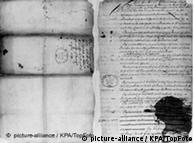History | 16.11.2009
The Glorious Revolution - January 22, 1689
The revolution was preceded by bloody conflicts which threatened to plunge Britain into civil war. The first serious conflict happened in 1628, when Britain's King Charles I (1600 - 1649) was forced to admit that officers of the court continually abused the royal right to arrest people. At the order of the king, officers would threaten wealthy citizens with arrest in order to extort money from them. The Petition of Rights from June 7, 1628, attempted to put a stop to such abuse by decreeing that no one could arbitrarily be arrested, and that anyone who was detained had the right to a fair and speedy trial. The Petition of Rights became a cornerstone of all democratic legal systems.
Habeas Corpus
 Bildunterschrift: Großansicht des Bildes mit der Bildunterschrift: Pope Innocent XI
Bildunterschrift: Großansicht des Bildes mit der Bildunterschrift: Pope Innocent XI
In medieval England, however, the Petition of Rights still needed to withstand some tough tests. When rumors spread across the mainly Protestant island that Pope Innocent XI (1611 - 1689) was planning to re-Catholicize England, unrest erupted which resulted in the deposition of a parliament that was largely loyal to the king. King Charles II (1630 - 1685) attempted a heavy-handed response. Random arrests and incarcerations became daily occurrences. In particular, the transfer of difficult prisoners to jails in the overseas colonies ruffled plenty of feathers.
Charles II was accused of completely disregarding the Petition of Rights. In order to end this state of affairs for once and for all, Charles was forced to sign the Habeas Corpus Act in 1679, during a weak phase of his reign. The act was named for the Latin beginning of the medieval arrest warrant, and stipulated that prisoners could be released on bail, and would be granted a hearing before a judge within three days of arrest.
William III of Orange
 Bildunterschrift: Großansicht des Bildes mit der Bildunterschrift: King Charles II of England
Bildunterschrift: Großansicht des Bildes mit der Bildunterschrift: King Charles II of England
But the signature of the king did not end the power struggle on the British isle. During these troubled times at home, where rumors of the pope's plans to re-Catholicize Britain refused to go away, several liberal "Whig" parliamentarians began talking with strict Protestant, William III of Orange (1650 - 1702). He was married to one of Charles II's daughters, who was likewise raised as a Protestant. The parliamentarians offered him the throne, on the condition that he sign the Bill of Rights, which contained several clauses for the protection of parliament.
William of Orange didn't need to be asked twice. When he landed in England on November 5, 1688, Charles II fled to France, clearing the path for both William and the Bill of Rights. The king was obliged to call regular parliamentary sessions; he had to obtain parliamentary approval for any new taxes; and he was not permitted to fund an army in times of peace. Parliamentarians were also granted immunity, meaning they could do their jobs without fear of being arrested or sued by the king.
The Habeas Corpus Act was confirmed within the Bill of Rights, and its rules still form the basis of the modern European system regarding arrests. The civil rights declaration of the French Revolution of 1789, the US Constitution of 1791, the Belgian Constitution of 1831, the German Constitutions of 1849 and 1919 as well as the German Basic Law of 1949 are all based on the Habeas Corpus Act. This common tradition in the formation of constitutional rights shows how the people of Europe didn't just influence each other through cultural exchanges or trade relationships. Rather, they influenced each other through ideas, through hard-won political rights and the legal principles that evolved as a result.
 Bildunterschrift: Großansicht des Bildes mit der Bildunterschrift: English Bill of Rights 1689
Bildunterschrift: Großansicht des Bildes mit der Bildunterschrift: English Bill of Rights 1689
The rights granted through the Glorious Revolution in 1689 still apply in European democracies today: free parliamentary elections, parliament's right to free debate, immunity for parliamentarians, taxation only with parliamentary approval, and no standing army without the consent of parliament. In January 1689, the legal framework was laid for a parliamentary democracy, with the sole demand on all members of society being that they abide by the existing laws.
Author: Matthias von Hellfeld (dc)
Editor: Andreas Illmer

Comments